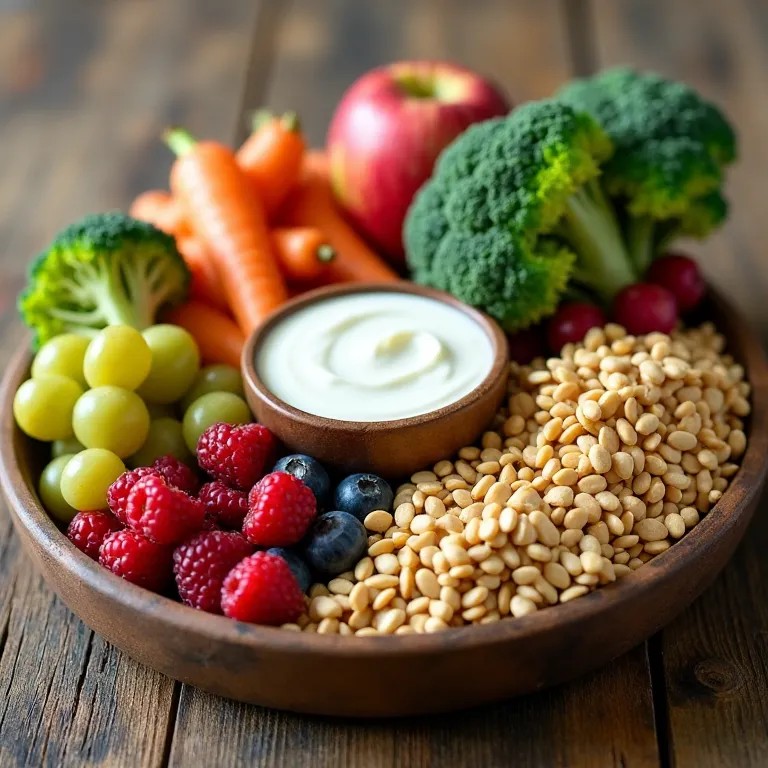Struggling with blood sugar spikes or energy crashes? Low GI carbs could be your game-changer. This post reveals why choosing low glycemic index carbohydrates helps you maintain steady blood sugar, manage weight, and improve overall health.
What are Low GI Carbs?
Low GI (glycemic index) carbohydrates are foods that digest slowly, releasing glucose gradually into your bloodstream instead of causing a quick spike. The glycemic index rates carbs from 0 to 100 based on how fast they raise blood sugar—55 or below is considered low GI. Examples include whole grains, legumes, most fruits and vegetables, and dairy products like milk and yogurt.
📌 Simply put: Low GI carbs provide long-lasting energy without the blood sugar rollercoaster.
💪 5 Reasons Why Low GI Carbs Are Beneficial
1. Stabilize Blood Sugar Levels
Low GI carbs break down slowly, preventing rapid blood sugar spikes and dips which contribute to energy crashes and cravings. This is especially important for people managing diabetes or insulin resistance.
✔ Slow-release carbs keep your blood sugar steady for hours.
2. Help with Weight Management
Because they keep you feeling full longer by digesting slowly, low GI carbs reduce overeating and snacking. This can support healthy weight loss and maintenance by controlling hunger and reducing fat storage.
✔ Low GI carbs curb appetite and assist in fat loss.
3. Increase Energy and Focus
Steady glucose supply from low GI foods fuels your brain and muscles evenly, avoiding the sluggishness or jitteriness caused by quick sugar rushes. That means more consistent energy for work, workouts, and daily activities.
✔ Enjoy balanced energy and sharper mental clarity all day.
4. Reduce Risk of Chronic Diseases
Eating low GI carbs is linked with lower risks of type 2 diabetes, heart disease, and certain cancers. This is because stable blood sugar and insulin levels reduce inflammation and oxidative stress in the body.
✔ Support long-term health by choosing low GI foods.
5. Promote Better Digestion
Many low GI carbs are rich in fiber, like beans, whole grains, and vegetables. Fiber aids digestion, improves gut health, and helps regulate blood sugar absorption.
✔ Fiber-rich carbs keep your digestive system happy and healthy.
🥗 How to Use Low GI Carbs Effectively!
- 🥄 Choose whole grains like brown rice, quinoa, barley, or whole-wheat pasta instead of refined grains
- 🥗 Include plenty of legumes such as lentils, chickpeas, and kidney beans in meals
- 🍎 Pick fruits like apples, oranges, and berries over tropical, high-GI fruits like watermelon or pineapple
- 🥛 Incorporate low-fat dairy such as milk or yogurt which have naturally low GI values
- 🥦 Fill half your plate with non-starchy vegetables like broccoli, spinach, and carrots
💡 Tip: Pair carbs with protein and healthy fats to further slow glucose release and enhance satiety.
📌 Conclusion – Start Using Low GI Carbs Today!
Switching to low GI carbs can transform your energy levels, improve blood sugar control, and support weight loss while reducing chronic disease risks. Start including these foods in your diet gradually and notice the steady energy and improved wellbeing. Ready to make the change? Add more whole grains, legumes, and fresh fruits and veggies to your meals today!
| Item | Effect Summary |
|---|---|
| Low GI Carbs | Slow digestion for steady blood sugar and energy |
| Whole grains | Brown rice, quinoa, barley |
| Legumes | Lentils, chickpeas, kidney beans |
| Fruits | Apples, oranges, berries |
| Dairy | Milk, yogurt (unsweetened) |
| Vegetables | Broccoli, carrots, spinach |
Quiz Time!
Question: What GI value defines a low glycemic index food?
Answer: 55 or below.
If you found this helpful, please share or comment below! Stay tuned for our next post on the best low GI meal plans for busy lifestyles.
References
- Harvard Health Publishing, A good guide to good carbs: The glycemic index, health.harvard.edu
- Mayo Clinic, Low-glycemic index diet: What’s behind the claims?, mayoclinic.org
- Diabetes UK, Glycaemic index and diabetes, diabetes.org.uk
- Medical News Today, Low-glycemic foods: Best options and dietary tips, medicalnewstoday.com
- Better Health Channel, Carbohydrates and the glycaemic index, betterhealth.vic.gov.au


Leave a Reply